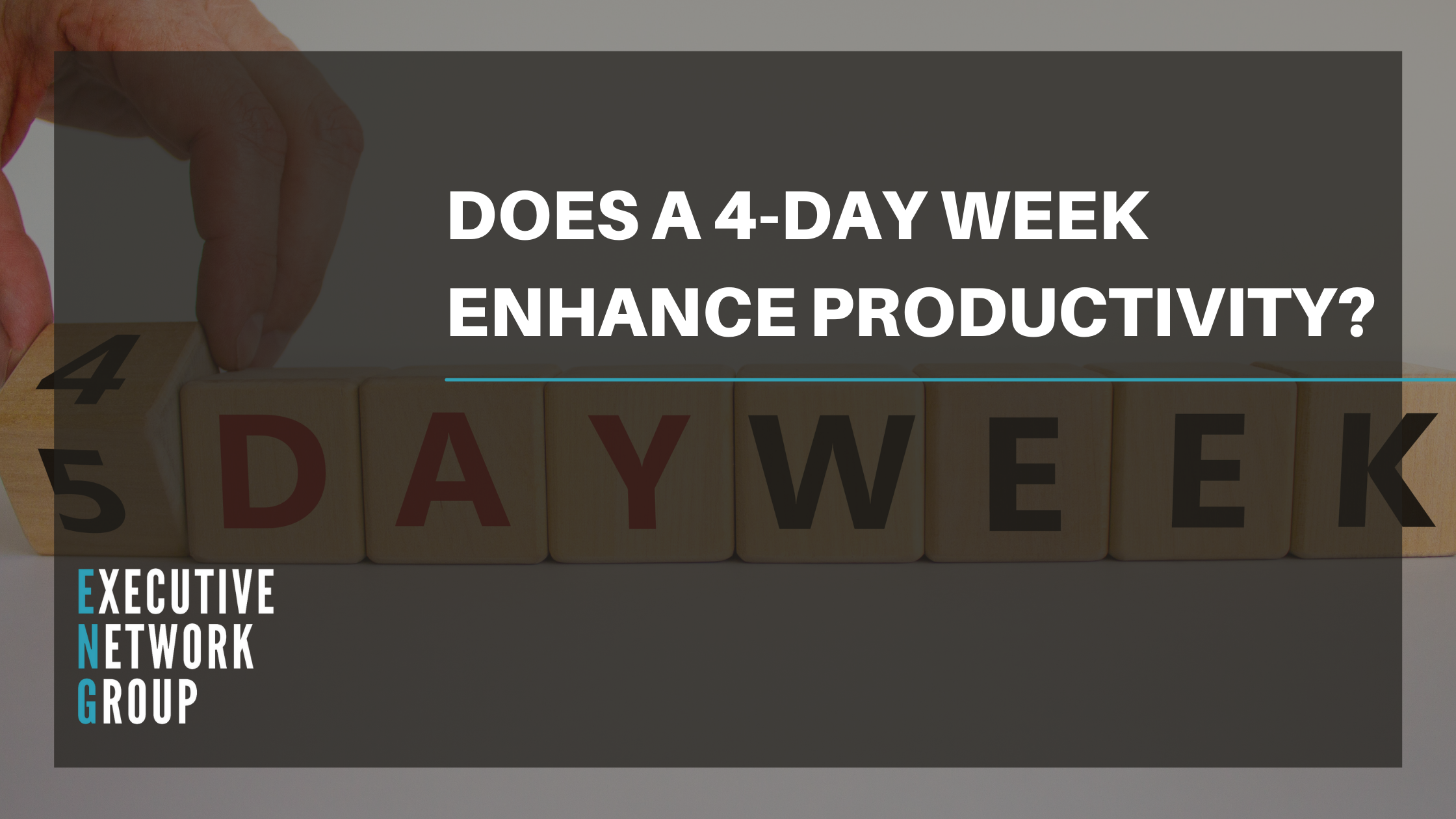Does a 4-Day Week Enhance Productivity?

The very idea of a 4-day week may have many employees dreaming of another morning spent in bed, as the weekend always seems to be gone as soon as it arrives. However, could this dream become a reality if the UK working week transforms into 4 days rather than 5?
The work-life balance continues to be a much-discussed topic since millions were sent to work from the comfort of their own home due to the ongoing Covid-19 pandemic.
But ever since 2015, trials have been put into place to test the inclusion of a new 4-day working week.
The Effect of Covid-19 on Work Culture and the Scrutiny of Work-Life Balance
The Covid-19 pandemic has impacted work culture, from remote working, remote onboarding and overall inclusivity. As the months went on and people slowly began to return to their desks, flexible culture remained, and working from home became “the new normal” for many.
The choice was given to white-collar workers over where they work, with more impetus on their work-life balance and what was best for them rather than a strict employer schedule.
Technology had also taken centre stage – video technology, in particular, had a huge uptake for both internal and external communications alongside hiring processes moving online which many stated increased efficiency.
The stress of the pandemic and the health concerns it raised caused a period of reflection where people looked to focus on what is most important in life. The time they spent away from loved ones led to a change in the status quo.
Sometimes reluctantly - employers began to empower their staff to choose where they worked, as long as it met certain criteria. The opportunity to continue to work from home either permanently or part-time became commonplace, while the ability to start and finish earlier or later was introduced.
With this new sense of flexibility around work culture, the conversation of a 4-day week, which has been discussed for years now, has intensified.
The Icelandic Trials and the UK Introduction
From 2015 to 2019, studies in Iceland took place to test these exact properties. These trials considered factors such as employee productivity to work-life balance. They found that a 4 day week did not hurt productivity and, in many cases, remained the same or improved.
Work-life balance also seemed to improve, as an extra day allowed employees to take up new hobbies, spend more time with friends and family and allow them to recharge before returning to their working week recharged.
This work culture has now seemingly begun to transition into the UK. Atom Bank has offered a new 4 day week to their 430 employees – however, this is not without its caveats.
To eliminate any loss of earnings for an employee’s salary: “Employees now work 34 hours over four days and get Monday or Friday off, when previously they clocked up 37.5 hours across the whole week.” – BBC News
The Risk of Burnout
This does beg the question about burnout with 4 more intense days a week, does this improve productivity in the late hours of the day?
The daily 9-5, or equivalent, is designed to give people the right balance between work and rest, so having longer work days may lead to burnout which could pass on without adequate downtime before the next day - especially as people may be working on location so travel time would add more hours not spent recuperating.
Many have suggested it would be wise to have a companywide additional day off – but what does this mean for company profits to have one day completely downing the tools? If all employees were permitted to choose their extra day off, it could cause havoc with workflows and team integration. Most of the touted 3rd days we’ve seen have been either Friday or Monday – thereby extending the weekend by one day.
Would having the extra day in the middle of the week, such as a Wednesday, give employees a rest after the first 2 days and allow them to maximise their productivity for the next 2 days? Another point to consider, is how this would impact customers and profits if they don’t mirror their client’s working habits.

Recruitment and Retention of Employees
Job seekers are more observant of company flexibility than perhaps they were 3-5 years ago. The new work culture of picking your hours and working around a tailor-made schedule has become a necessity for millions of people.
Due to this, applicants are more likely to pass up on opportunities that do not offer this freedom.
Companies must adhere to this new shift in culture or risk losing out on talent due to their rules around workflows looking outdated.
Businesses that seem to modernise their approach and prioritise their staff over rigid schedules are much more appealing to job seekers.
“Smart employers know that offering flexible schedules benefits them, too. From being a green company to having an edge in recruitment and improving diversity, the benefits of flexible work for companies can help your business stay ahead of the competition.” - Flexjobs
The Thoughts of ENG Managing Director - Matt Ellis
“Flexible working, hybrid working, home working, mobile working, work-life balance, 4-day working weeks - I don’t know about you, but I struggle to keep up with all the new variants and badges given to the way we work.
The Covid-19 pandemic has catapulted certain sectors and businesses into various forms of working not seen before in the UK. Many of them now seem obsessed with battling to find the right balance between “productivity” & “employee engagement”.
My experience of “balance” is there is always a battle between the two parties meaning a balance is almost impossible to find. When we think about work-life balance with “work” sitting on one side of the see-saw and “life” sitting on the other with opposing needs and objectives, how can a balance be genuinely found? One has to compromise for the other, and the see-saw keeps tilting. When trying to integrate the two and understanding work should be an embraced part of your life and life an integral part of your work, suddenly things become more apparent – a goal of work-life integration makes a lot more sense to me.
So, where will all these new “working models” take us? Offering flexibility & autonomy can certainly strengthen employee engagement, but on its own, does it deserve employee loyalty?
Outstanding future companies will undoubtedly offer some flexibility and work-life integration. Still, they will focus on having a shared purpose, sharing success with their team and being the absolute best at what they do in their chosen space. In my opinion, this is the formula for the future and not the structure of the working week.”
.png)
